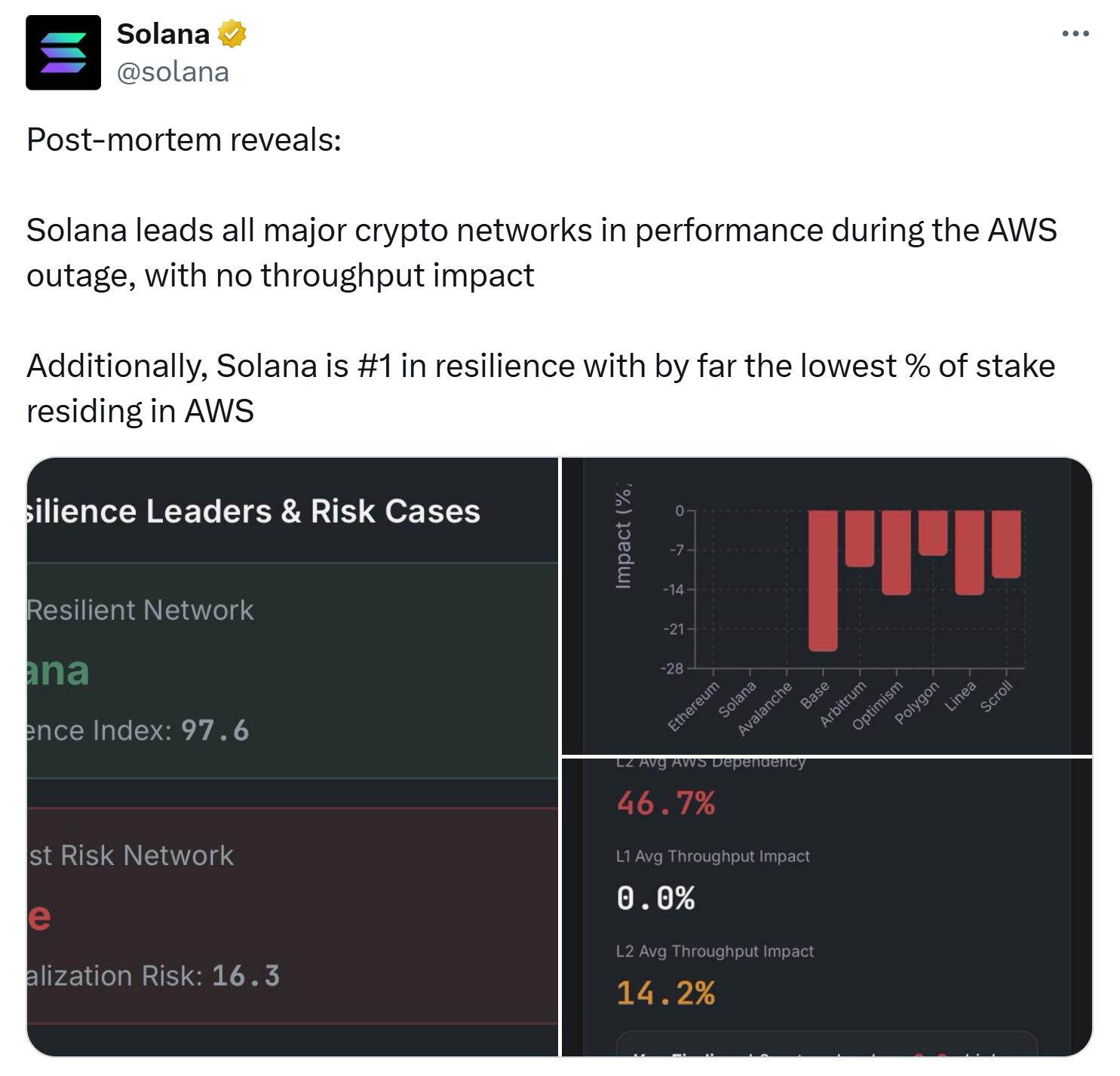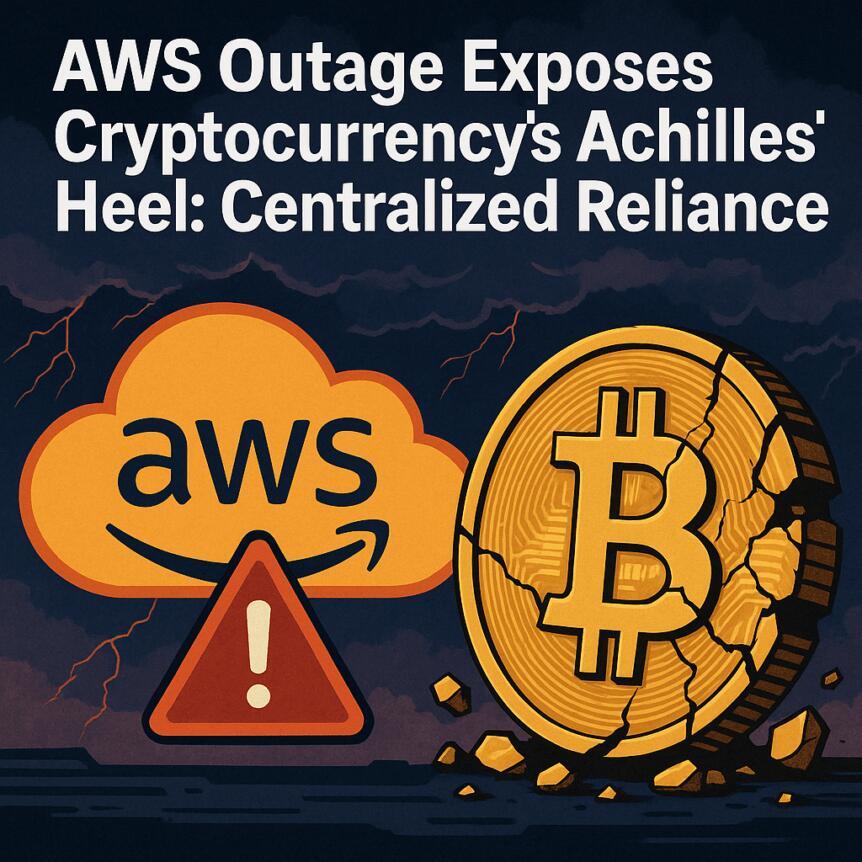
AWS Outage Exposes Cryptocurrency's Achilles' Heel: Centralized Reliance
- The AWS outage temporarily disrupted access to major crypto platforms, exposing dependence on centralized servers for Web3 infrastructure. Industry leaders advocate for hybrid models blending cloud scalability with decentralized storage and community nodes for greater resilience. Experts warn that full decentralization remains challenging at scale and emphasize diversifying infrastructure to mitigate concentration risks. The incident underscores the need for Web3 builders to accelerate development of decentralized cloud and storage solutions.
The recent Amazon Web Services (AWS) outage that took down popular crypto and fintech platforms such as Coinbase, Robinhood, MetaMask, and Venmo has reignited discussions about the true decentralization of Web3. Although blockchain networks like Bitcoin continue to produce blocks without interruption, users relying on centralized hosting for their wallets, exchanges, and decentralized applications (DApps) faced significant disruptions. This event underscores the persistent reliance on centralized infrastructure even within a movement built on decentralization principles.
“Decentralization has succeeded at the ledger layer but not yet at the infrastructure layer,” argued Jamie Elkaleh, chief marketing officer at Bitget Wallet.“Achieving genuine resilience requires moving beyond hyperscalers to community-driven and distributed networks.” Elkaleh noted that full decentralization at scale remains elusive because most teams depend on cloud giants like AWS, Google Cloud, and Azure for compliance, speed, and uptime. The industry's practical goal, he emphasized, should be creating“credible multi-homing” infrastructure that distributes workloads across cloud services and decentralized networks to prevent single points of failure.
Elkaleh pointed out that while cloud providers offer significant benefits in scalability and security, dependence on them creates concentration risk.“If one provider or region goes offline, hundreds of applications are affected,” he said. The future lies in hybrid systems that combine cloud resources with decentralized storage and community-run nodes, offering both reliability and resilience.
X user humorously mocks so-called decentralized platforms. Source: Kunal GandhiUsers were locked out of working blockchains
Anthurine Xiang, co-founder of EthStorage and QuarkChain, pointed out that the outage exposed an over-reliance on centralized infrastructure even within the crypto space.“True decentralization demands redesigning every layer, from storage to access, so no single provider can bring systems offline,” she said.“What we experienced was akin to having a house with a jammed door - the blockchain itself was fine, but users couldn't access their assets.”
The outage, which lasted around 15 hours beginning Monday, disrupted access to Coinbase's app and Base network, preventing users from logging in or executing transactions. Robinhood traders faced delays and API failures, while MetaMask users reported seeing zero balances because the service responsible for fetching wallet data went offline. Xiang clarified that the blockchain assets remained safe, as the failure was rooted in infrastructure components rather than the blockchain protocols themselves.
Jawad Ashraf, CEO of Vanar Blockchain, criticized industry reliance on a small number of centralized servers.“About 70% of Ethereum nodes are hosted on AWS, Google, or Microsoft,” he noted, equating it to paying three landlords instead of diversifying. While fully decentralized systems are feasible, Ashraf added that most teams prefer cloud hosting due to its speed and simplicity, despite the risks involved.

Solana reports no throughput impact from the outage. Source: SolanaA wake-up call for the industry
Elkaleh emphasized that this outage should serve as a catalyst for increased investment in decentralized cloud, storage, and compute networks, such as Akash, Filecoin, and Arweave. He advocates for more adoption of hybrid models that blend the best of traditional cloud reliability with decentralized redundancy, ensuring a more resilient crypto infrastructure.
“Every major outage is an urgent wake-up call,” Elkaleh remarked.“The future of Web3 won't be defined solely by the decentralization of tokens but by how effectively the infrastructure itself is distributed and resilient.”
Crypto Investing Risk WarningCrypto assets are highly volatile. Your capital is at risk. Don't invest unless you're prepared to lose all the money you invest.
Legal Disclaimer:
MENAFN provides the
information “as is” without warranty of any kind. We do not accept
any responsibility or liability for the accuracy, content, images,
videos, licenses, completeness, legality, or reliability of the information
contained in this article. If you have any complaints or copyright
issues related to this article, kindly contact the provider above.
















Comments
No comment